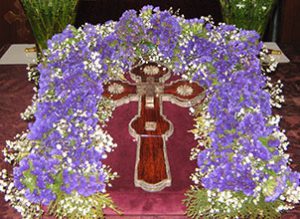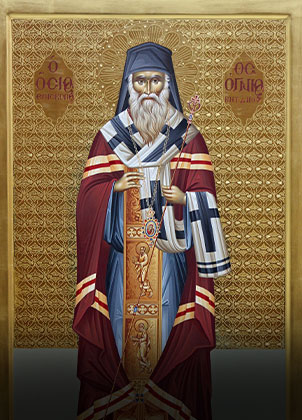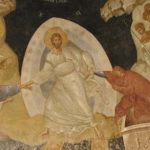Сравнение экклезиологии митр. Киприана и РПЦЗ
Зарубежная экклезиология
Хотя в Зарубежной Церкви не делалось соборных определений о наличии или отсутствии благодати в церквах «Мирового Православия», но можно сказать, что мнение проф. И. Андреевского было таким ориентиром, на который многие равнялись. В работе «Благодатна ли Советская Церковь?» он говорит, что:
1. «отпадение церкви от Бога… есть процесс».
2. «Советская церковь … встала на путь,…который ведет ее к превращению из церкви Христовой в «сборище сатанинское».
3. «от общения с советской церковью мы отказываемся, ибо сомневаемся в ее благодатности».
В соответствии с этим, можно так сформулировать экклезиологию РПЦЗ в отношении к Мировому Православию:
1. Церкви Мирового Православия идут по пути отступления, который неизбежно приведет их к отпадению от Церкви – тела Христова. Мы не имеем никакого общения с церквами Мирового Православия, потому что не хотим участвовать в их отступничестве.
2. Отпадение от Церкви такой огромной структуры, как Мировое Православие, – это процесс, который не может совершиться мгновенно. Он происходит неравномерно, т.е быстрее в одной части и медленнее в другой.
3. В какой мере этот процесс уже завершился, известно одному Богу. Вопрос о наличиии или отсутствии благодати в церквах Мирового Православия лежит в плоскости свободы мнений, а не в области обязательного для всех учения Церкви.
Например, Св. Филарет Нью-Йоркский был убежден, что процесс завершился и Моск. Патриархия не имеет благодати таинств, но он всегда добавлял, что это его личное мнение. Другие архиереи не соглашались с ним. Зарубежные архиереи, имея различные мнения по этому вопросу, принадлежали к одному Собору и не обвиняли друг друга в неправославии.
Экклезиология митр. Киприана.
Экклезиология митр. Киприана (Куцумбы) возникла как реакция на позицию других греческих Истинно-Православных синодов, которые объявили новостильную греческую церковь безблагодатной. Митр. Киприан не соглашался с таким мнением, считая его экстремистским. Сам митр. Киприан утверждал обратное, т.е. что таинства новостильников-экуменистов действительны и благодатны. Для обоснования своего мнения он создал концепцию, изложенную им в работе «Экклезиологические Тезисы».
Согласно митр. Киприану, в настоящее время Церковь разделена на две части: православную и еретическую. И в той и другой части имеется благодать таинств. Еретики-экуменисты будут пребывать в Церкви до тех пор, пока экуменизм не будет соборно осужден. Однако, соборы православных, противников экуменизма, не полномочны совершить суд над ересью экуменизма. Для вынесения окончательного суда над ересью экуменизма обе части Церкви, православная и экуменистическая, должны собраться на объединительный Собор. Он анафематствует экуменизм и снова объединит разделенную Церковь.
Не нужно обладать большими богословскими познаниями, чтобы увидеть, что эта концепция неправославна.
Мы веруем во едину, святую, соборную и апостольскую Церковь. Церковь никак не может быть разделена на части с различным исповеданием. Это противоречило бы единству Церкви. Также мнение митр. Киприана, что еретическое сообщество может оставаться частью Церкви, причем практически неограниченное время, противоречит догмату о святости Церкви. По согласному учению св. Отцов, благодать таинств присутствует только в Церкви, а еретические сообщества не принадлежат к Церкви, и потому в них не может быть благодати таинств.
Не вдаваясь в детали, сразу видно отличие экклезиологии митр. Киприана от экклезиологии РПЦЗ. Иерархи РПЦЗ анафематствовали экуменизм в 1983 г., однако они, по икономии, не спешили открыто называть еретической всю иерархию Мирового Православия, все еще надеясь на их обращение.
Митр. Киприан, с другой стороны, прямо называет иерархов Мирового Православия еретиками и в то же время утверждает, что они, будучи еретиками, остаются частью Церкви. Более того, он подтверждает свое мнение писаниями св. Отцов, и таким образом, выдает его за учение Церкви, обязательное для всех.
Зарубежные иерархи не выносили соборного суда о благодати таинств в Мировом Православии, оставляя этот вопрос в плоскости частных мнений, а митр. Киприан выносит такой суд, причем утверждает, что его мнение единственно правильное.
Если позиция иерархов РПЦЗ есть икономия, то учение митр. Киприана – несомненно, ересь.
Однако, отсюда необязательно делать заключение, что сам митр. Киприан был еретиком. Как известно, ошибочные мнения имелись даже у некоторых прославленных святых. Учение митр. Киприана было создано, как антитеза черно-белой концепции «сверх-правильного» формализма, который в неменьшей степени чужд духу православия.
Экклезиология митр. Киприана – это попытка богословского осмысления современного состояния Церкви, беспрецедентного в истории. Однако, эту попытку никак нельзя считать удачной. В оправдание митр. Киприана нужно сказать и то, что этот вопрос до сих пор не имеет однозначного соборного богословского решения.
Мы должны придерживаться традиционной позиции Зарубежной Церкви, не принимая неправославных мнений митр. Киприана, но и не скатываясь в фарисейский формализм лжеименного «зилотства».
Еп. Андрей
A Comparison of the Ecclesiologies of the ROCA and Metropolitan Cyprian
The Ecclesiology of the Church Abroad
Although the Church Abroad has not issued conciliar determinations on the presence or absence of Grace in the churches of “World Orthodoxy,” we can say that the views of Prof. I. Andreyevskiy have been a guideline to which many have subscribed. In his work, “Does the Soviet Church have Grace?”, he offered the following:
- “the falling away of a church from God…is a process.”
- “the Soviet Church has embarked on a path which leads to its transformation from a church of Christ to a ‘satanic assembly’.
- “we have no communion with the Soviet Church because we doubt it possesses Grace.”
Accordingly, the ecclesiology of the ROCA in regard to World Orthodoxy can be formulated as follows:
- The churches of World Orthodoxy are on a path of apostasy, which inevitably will lead them to falling away from the Church – the body of Christ. We have no communion with the churches of World Orthodoxy because we do not wish to participate in their apostasy.
- The falling away from the Church of such a large structure as World Orthodoxy is a process that cannot be completed instantly. It doesn’t occur everywhere at the same pace: faster in some instances, slower in others.
- To what extent this process has already concluded is known only to God. The question of whether Grace is present or absent in the churches of World Orthodoxy resides at the level of personal opinion, not in the realm of the Church’s compulsory teachings.
For example, St. Philaret of New York was convinced that this process had concluded and that the Moscow Patriarchate’s sacraments did not have Grace, but he always added that this was his personal opinion. Other bishops disagreed with him. Although the ROCA bishops had differing opinions on this subject they still belonged to one Council of Bishops and did not accuse each other of not being Orthodox.
The Ecclesiology of Metropolitan Cyprian
The ecclesiology of Metropolitan Cyprian (Kutsumbas) arose as a reaction to the position taken by other Greek True Orthodox synods proclaiming that the New Calendar Greek Church did not have Grace. Met. Cyprian did not agree with this opinion and considered it to be extreme. Met. Cyprian maintained the opposite, that the sacraments of the New Calendarists-Ecumenists were valid and had Grace. To support his view, he developed a concept that he explained in his work, “Ecclesiological Theses.”
According to Met. Cyprian, the Church is presently divided into two parts: Orthodox and heretical. The sacraments of both have Grace. Heretic ecumenists will remain in the Church until ecumenism is condemned by a Council. However, councils of the Orthodox who are opponents of ecumenism, are not competent to pass judgment on the heresy of ecumenism. For a final judgment on the heresy of ecumenism, both parts of the Church, the Orthodox and the ecumenical, must gather in a unification Council. This Council will proclaim anathema against ecumenism and will again unite the divided Church.
One need not possess great theological knowledge to see that this concept is not Orthodox.
We believe in the one, holy, catholic and apostolic Church. The Church cannot possibly be divided into parts with differing beliefs. This would contradict the oneness of the Church. Also, Met. Cyprian’s opinion that a heretical group can remain a part of the Church, for practically an unlimited time, contradicts the dogma of the holiness of the Church. In accordance with the teachings of the Holy Fathers, the Grace of the sacraments exists only in the Church, while heretical communities do not belong in the Church and therefore their sacraments cannot have Grace.
Without going any further, the differences between the ecclesiology of Met. Cyprian and of the ROCA are immediately apparent. The ROCA bishops anathematized ecumenism in 1983, but applying the principle of oikonomia, did not rush to openly condemn all the hierarchies of World Orthodoxy as heretical, in the hope that they might return to the fold.
Met. Cyprian, on the other hand, directly calls the hierarchs of World Orthodoxy heretics, while at the same time asserting that they, as heretics, remain a part of the Church. Furthermore, he bases his opinion on the writings of the Holy Fathers, and in this fashion presents it as a teaching of the Church, required of all of us.
The ROCA bishops did not issue a conciliar judgment on the Grace of the sacraments of the churches of World Orthodoxy, leaving this as a matter of personal opinion. Met. Cyprian, however, does make such a judgment and even insists that his opinion is the only correct one.
If the position of the ROCA bishops is oikonomia, then the teachings of Met. Cyprian are undoubtedly a heresy.
However, it is not necessary to extend this point to the conclusion that Met. Cyprian himself was a heretic. As we know, mistaken beliefs were even held by some Orthodox saints. Met. Cyprian’s teachings were created as an antithesis to the black-and-white “ultra-correct” formalism that is just as foreign to the spirit of Orthodoxy.
The ecclesiology of Met. Cyprian was an attempt to theologically conceptualize the current, historically unprecedented, state of the Church. However, this attempt cannot be considered successful. In Met. Cyprian’s defense, it should be said that to this day this question has not received an unambiguous conciliar, theological determination.
We must adhere to the traditional position of the Church Abroad, not accepting the unorthodox opinions of Met. Cyprian, but also not descending into the pharisaical formalism of false “zealotry.”
Bishop Andrei









